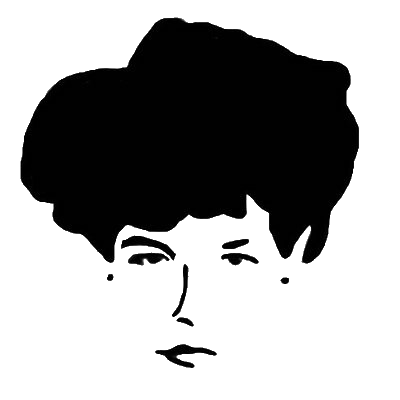IMAGINARY CATS
The truth of the matter was I could never return to the whiskers quilled and dull. There were tufts everywhere. I’d spent too many years hoveled in trees, too many dense years inside a parable for one type of loneliness. Here is how to enamor yourself to no one: erect a small army of air, papier-mache its invisible structure over an invisible man. He will resist the clarity of being known. What this means is victory. Next the cats will come from the trunks and they will look strange, jailed fur and alien eyes more a sound than a color, sound like a fruit peeled behind glass, a sound that can stare. Allow them onto your branch and let them speak. A new man will have picked up your scent, is trothed to it now. Your oneness has made you a princess. You must change. A new army approaches. Billboards grow in bundles like mint. Pavement cracks and follies. Someone is waiting. No: I’ve set fire to all the trees.
THE EPICURE
My worries were a white paste I made efforts to cook down. The process was hard since it required fresh herbs, an ability to balance charm and self-effacement in place of actual discovery. To be frank I used rat meat, didn’t wash the fur. It tasted bubonic. I added salt from a blind horse’s nine tears, precisely nine. It tasted like my mother standing over a stew with her hate, it tasted like the open can she was close to crushing. I pressed two fingers to my breasts searching for a hidden history, a more exact poison, but nothing. I fed rat tail through each earlobe, didn’t want scraps. My prettiness hedged on this steaming pot so I dropped in clumps of eyelashes. I whispered my embolisms onto a bay leaf. I tied myself to the stovetop and left the room.
INHERITING THE PALEOLITHIC ART ANTHOLOGY
To return to the home I found so many treasures there. Piece of charred gutter, ash-soaked curtains, a cat jaw jutted from the dirt. A sunset pink as exposed fiberglass, how still I became over those favors. A mattress blackened where my girl-body once lay. When the fire took everything I mean it was a confession, my house collapsed, my animals dead. You were discarded, out of reach, a footnote highlighted in my grandfather’s great book. Only then did you not exist. Only then did my girlhood shape itself in a trailer. And for a nanosecond only I knew sorry. If, years later, I took men through my bay window, there was still a hill out back made of all of me smoked.
REMARKABLE WINTER
One drink after the next, I dreamed Prague my city, gave it steel and shiny black asphalt, immaculate women, men to curse themselves once in the night—such clean vision. The real occurred as a shapeless army, the procession of drunks with their small claims to life a stein of pilsner, goulash, the watery smiles falling from their mouths after dekujeme. An expat leaned close to my ear, said “We let the world take us again and again”: nazism, communism, capitalism: all these bodies dragged heaven-fat across the Charles bridge isn’t it gorgeous. I’m told the Czech have no word for city. I’m told the men are thick with songbirds pretty and tucked in their guts. My chest stuffed with boar meat I am sick and charging, false prophet of my own tongue. When a street crone waved a toy at me and begged for money, then followed me cursing, spitting at my feet, shielding the toy from my sight, I imagined my love a marionette his torqued face forecasting my death. The expat leaned in again. “We cannot care what is possibly done to us. Look how I speak English to you.” I was glad for the sun so early fled from this world, the night able to statue me to this clock-tower memory where I hang all my men. I was glad for the drink in my hand. It was mine.
